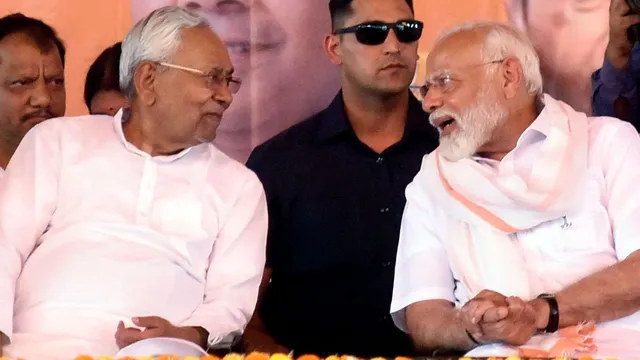- By Anushka Vats
- Mon, 22 Jul 2024 09:21 PM (IST)
- Source:JND
The central government on Monday denied the special status to Bihar citing an inter-ministerial group report prepared in 2012 and asserted that a case for granting special category status to Bihar is not made out; a stand which came a day after BJP's allies from Bihar demanded the status for the backward state.
In a written reply during the Monsoon session's first day in Lok Sabha, Minister of State for Finance Pankaj Chaudhary said that the case for special category status for Bihar is not justified. He also explained that special category status had been historically granted by the National Development Council (NDC) to states with specific characteristics requiring special consideration.
Why Centre Has Been Denied Special Status?
MoS Chaudhary stated that the NDC previously granted special category status based on specific characteristics requiring special consideration including hilly and difficult terrain, strategic location, low population density or a sizable tribal population alongside borders with neighboring countries, economic and infrastructural backwardness, and the non-viability of state finances.
"Earlier, the request of Bihar for Special Category Status was considered by an Inter-Ministerial Group (IMG) which submitted its Report on 30th March 2012. The IMG came to the finding that based on existing NDC criteria, the case for Special Category Status for Bihar is not made out," the minister said while denying special status to Bihar.
How Does A State Get Special State Tag?
- The status of a special state is given to those states which are backward on economic, social and geographical basis. Although there is no such provision in the Constitution, but in 1969, on the advice of the Fifth Finance Commission, a provision was made for giving the status of special state for the first time.
- According to the letter issued by the Finance Ministry, states with hilly and difficult terrain are given the status of special states.
- Apart from this, the special state category includes those areas where there is low population density or a large tribal population.
- Those states which have strategic locations on the borders with neighbouring countries are considered for granting special status.
- Economic and infrastructural backwardness and non-viable nature of state finances are included, such states get the status of special state.
Facilities Given To States With Special Status
- The money given by the Central Government to the states that get special status is 90% grant and 10% interest-free loan.
- Special states also get huge exemptions in income tax, GST, excise, customs and corporate.
- Moreover, if the particular state does not spend the money then the remaining amount is released for the next financial year.
Bihar Demanding Special Status Since 2005
- The demand for granting special state status to Bihar has been raised since 2005. CM Nitish Kumar had made this demand from the central government as soon as he became the Chief Minister in 2005.
- He says that until Bihar gets the status of a special state, additional funds should be given to the state.
- All political parties have raised their voice on this issue. Bihar Congress President Akhilesh Prasad Singh also on Sunday. He said that during the budget session, NDA leaders of Bihar should demand special state status.
- RJD has also been demanding special state status for Bihar for a long time. From Tejashwi Yadav to Rohini Acharya, everyone attacked the BJP on this issue.
- Recently Rohini Acharya said that about one-third of the population of Bihar is living in poverty, in such a situation special state status is the immediate need of Bihar.
- Besides this, LJP (Ram Vilas) chief and Union Minister Chirag Paswan also said that this is not politics of pressure but our demand has been that Bihar should get the status of a special state. Which party in Bihar does not talk about the status of a special state and does not agree, they themselves are in favor of it.
(With inputs from agency)

